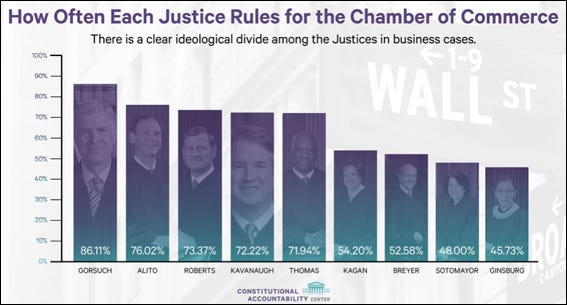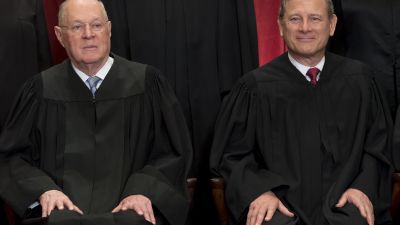This story first appeared in David Sirota’s newsletter TMI
If you are a reader of this newsletter, you know we cover Supreme Court cases that are often ignored by the media — cases about corporate power, labor rights and business regulations. These cases fill up the judicial docket and transform the American economy, but they are typically overshadowed by high-profile battles over social issues.
One huge question now is: How would adding another Donald Trump appointee to the court potentially change the judicial system’s attitude towards corporate power?
Bloomberg News reports that “the prospect of Republicans increasing their majority to 6-3, after the death of liberal icon Ruth Bader Ginsburg, could make the court more favorable for business.”
For a deeper look at the situation, I spoke with UCLA law professor Adam Winkler, the author of the book We the Corporations: How American Businesses Won Their Civil Rights. He has also written a series of articlesfor The Atlantic about corporations’ winning streak at the high court.
What follows is an edited transcript of my discussion with Winkler about the current situation on the court and how the judicial system could ultimately be reformed.
Q: In general, how much is the high court dealing with business and economic issues?
A: While the high profile, controversial cases over issues like abortion or gay rights take up all the headlines, most of the Supreme court’s docket is focused on ordinary business disputes and disputes that affect businesses and business people. They’re not all corporate power cases directly in the sense that they’re not like Citizens United (and) about whether corporations can spend money on elections, but they’re issues like how do we read employment discrimination laws.
The Supreme Court just this past year narrowly read federal employment discrimination laws to make it harder for employees to bring an employment discrimination action. You don’t necessarily read that when you read it in the newspaper as a corporate power issue, but it’s clearly a corporate power case. It’s giving powers to corporate management and corporate employers and making it easier for them to discriminate without the threat of significant legal liability.
Then there are cases that don’t seem like they touch upon corporations at all, but have a huge impact on the ability of government to regulate corporations.
So for instance, if the court has what seems like a rather esoteric case about whether Congress can structure a federal agency in a particular way so that it’s commissioners are appointed… there’s a move afoot among conservatives to outlaw appointments so that every executive appointment should be subject to being fired by the president at the president’s whim. That doesn’t seem like a business case, but the effect of it is to make it harder for government agencies that regulate businesses to function.
The Consumer Financial Protection Bureau would be a good example. The director can’t be fired by the president (and) serves a certain term of years. If you call that into question, it makes it easier for businesses to escape regulation by the CFPB.
Q: You’ve written about the Supreme Court’s rulings on speech issues have strengthened corporate power. How does that matter to regular people in their daily lives?
A: One of the ways in which we restrict corporate speech is for instance, requiring dangerous products to provide labeling that informs consumers… (If) the Supreme Court continues its trend of broadly reading commercial speech protections in the Constitution that will make it harder for the government to force businesses to provide those warnings. We saw this, for instance, when a lower court used the commercial speech doctrine to strike down graphic warnings on cigarette labels…
The court could rule that basic securities laws that require disclosure of corporate behavior are unconstitutional as a violation of corporations’ free speech rights. In that case, it (would) really affect not only stockholders, but any employee who has retirement funds wrapped up in a mutual or pension fund…
There’s been a move afoot among libertarian law professors to push for the court to second guess securities laws and securities regulations that require corporations to disclose what they’re doing (and) all the various kinds of activities that they’re taking the matter to shareholders… So we could see corporate speech rights expanded to make it harder for the capital markets to have the transparency needed for safe investing.
Q: Let’s assume that Trump gets his way and gets another nominee on the court —
A: David, Trump always gets his way. Totally. Sadly, that’s the state of American politics.
Q: OK, so then how much would another Trump appointment tilt the current court? Is this a “game over” kind of moment?
A: I guess nothing’s over in the sense that the game just keeps getting played over and over again, it’s not like a baseball game or a basketball game that runs out of time or runs out of innings. Hopefully the country is going to survive another 10, 15, 20 years, but, look, a Trump appointment will very much solidify the power of corporations and businesses on the Supreme Court.
As it is, many of the Democratic appointees have been pretty pro-business over the years too. It’s not just conservatives. So even your liberals are often ruling in favor of businesses and against consumers.
This would really push the court over the top. You would have a very strong 6-3 conservative majority. And unlike previous times where conservatives had most of the seats on the court, none of the conservatives on (this) court really swing liberal on business or corporate power issues. John Roberts has swung liberal on a few cases in recent years to the celebration of many but his track record is pretty unambiguous and pretty consistently pro-business and anti-consumer.
Q: Is there anything Congress can do to reassert its power and not allow so much law to be written and determined by the Supreme Court?
A: There are controversial things that Congress can do that it really tends to hesitate to do. For instance, it could strip the Supreme Court of jurisdiction over certain kinds of cases. The Constitution is pretty clear that Congress can decide…
You might see that kind of aggressive approach in the next Congress depending on how this election goes, but we haven’t seen that tool used very often. I do think that Congress could be more assertive in its powers in a wide variety of ways that would tend not to necessarily limit the Supreme Court’s power, but do what the framers thought, which was counter power with power.
That’s how the framers thought you limited power. It was in part by having a contest between different branches of government over power, which would stop power from becoming really concentrated.
Q: What are some examples?
A: Being very active and passing a lot of laws (is a way for Congress to) make stronger efforts to assert itself.
When some Trump administration refuses to testify before Congress, well, why doesn’t Nancy Pelosi order the House marshals to go arrest the person and put the person in confinement and hold them in contempt of Congress? They have the power to do that…
What we see is that, consistently, Congress is afraid to exercise power… We don’t see that same hesitancy by the Supreme Court and we don’t see the same hesitancy by the president of the United States. The executive branch under any president — Democrat or Republican — has been very assertive looking to expand its power, looking to take advantage of any opportunity it has to exercise power. And we just don’t see the same from Congress.
We see presidents (like) George W. Bush expansively reading presidential power to allow signing statements. They’ll just ignore certain principles that are certain provisions of duly enacted legislation because of the statement (from) the president’s office…
President Obama did some of the same things and did a lot of stuff through executive orders and executive action that were somewhat questionable in terms of their legality.
And of course Trump’s done so many things such as refusing to allow any member of his administration to to testify before Congress in recent months. Just a blanket refusal to comply with congressional subpoenas. Those are just very bold and aggressive uses of power…
Divided government makes it harder for Congress to assert its power.
Q: Have the parties differed on using congressional power?
A: I think there are ways in which Republicans have been more aggressive in asserting power… There are a lot of Democrats that really feel uncomfortable with exercising power for power’s sake. A lot of Democrats feel there’s a right way to do something and it should be done that way, even if it hurts my own political beliefs or my own agenda.
I’m not saying every Democrat believes that. And I’m not saying that every Democrat adheres to that view. But I do think you already see it. There are already statements of Democrats expressing discomfort with the idea of packing the Supreme Court. I don’t think Republicans would hesitate to pack the Supreme Court.
Q: What is your view on adding seats to the Supreme Court? Is that a good idea or a bad idea?
A: There are lots of honest arguments not to do it… Up until about up until the Merrick Garland situation — up until really the Neil Gorsuch appointment in 2017 — it was the received wisdom among liberals all across the country (that) for most part that court packing was a bad idea, no matter who did it. (The idea was) that it undermines the legitimacy of the court, it turns the court more into a political football than it’s ever been before…
Obviously that opinion of many Democrats has radically changed in the last three years because of circumstances. But I think there are principled reasons. I mean, for the same (reason) why you’d want McConnell not to bring this nomination to the floor because democracy requires norms, norms require equal application by both sides. And you have a norm that was created about election year Supreme Court appointments. And it’s why many people think that Congress should stick to it now…
Q: The idea of nine people arbitrating so much of our laws seems problematic, especially when those nine people get on the court through a combination of happenstance and raw political power, rather than as a true expression of election results and the popular will. Is there a pro-democracy argument for adding seats to the court? Would that make it more representative of what the public wants?
A: I think there’s something to be said for it, for sure. But again, I think that you want to think about these things in terms of principles. If court packing is okay for Democrats, then it should be okay for Republicans too. And if Trump had decided to pack the court when he had the House and the Senate that would have been a disaster and it would’ve been wrong.
I get your point about democracy, but the Supreme Court is not supposed to be a democracy. It’s not supposed to be representative of the people. That’s not how it was designed and that’s not really how it’s ever functioned.
Q: Is that a problem? Do you think the court should be more democratic or not?
A: I do think it should be for sure. One of the great tragedies is that you’ve had the conservative control of the Supreme Court since the 1970s. It’s a half century now. It’s a long time since Nixon got four appointments (and) Carter got none. Then you had Reagan and Bush with all their appointments. There have only been four Democrats appointed to the Supreme Court since the 1960s. Over a half century there were Ginsburg, Sotomayor, Kagan and Breyer — and that’s it.
Democrats have only done a little bit better than that in terms of results because they had some who crossed over like Stevens and sometimes Kennedy. The Democrats have been living by the grace of Republican appointees who tend to cross over at some point. But it’s not because they’ve been winning.
Q: What are some realistic ways to fix some of the problems with the Supreme Court?
A: The only way to fix the system is through legislation, not a constitutional amendment. I don’t think that you’re going to get conservative states to agree to any kind of constitutional amendment on the Supreme Court, unless things change radically. So I think something like 18 year terms for the Supreme Court justices is a mistake. It’s not a bad policy. I’d love to see it as policy, but you have to get it through a constitutional amendment, not likely to happen.
But I think what you could do is increase the number of justices on the court. That’s a matter of legislation. That’s been done many times over the course of American history, not often since the 1860s, but before the 1860s had happened all the time. And so that’s something that we could do.
I think the key to doing it is not expanding the court to like 15 people and getting just enough justices so that the Democrats can respond to the Republican takeover of the Supreme Court through illegitimate means… But the answer could come in making the Supreme Court something like 40 people for a huge expansion. If you had 40 justices, any one retirement wouldn’t make the big difference.
Q: Would you have 40 judges ruling on every case?
A: What you probably do is what we have on the federal courts of appeals. (There are) approximately 25 justice judges on the ninth circuit court of appeals…They just randomly appoint judges (to hear cases). You can do that with the Supreme Court. You could still even have nine justices rule on any particular case. They’re selected for any particular case at random.
That’s just one possible idea of how you could depoliticize the court a little bit. It makes it hard to predict who’s going to rule…So it’s much more likely that judges are going to respect the previous decisions of the court, because they don’t know who’s going to come in next and overrule them.
Q: When you heard the news about Justice Ginsburg’s death, were you feeling like this is a major turning point for the judiciary in America?
A: I was pretty depressed Friday night (but) it doesn’t help anyone to spend a lot of time despairing over the future. You never know what the future brings.
It could be that because of this nomination, you have an incredible blue wave that sweeps the House, sweeps the Senate, sweeps the presidency, and you have the possibility of very significant Supreme Court reform and the possibility of getting significant legislation passed like a Green New Deal… So I think it doesn’t pay to really get too depressed about how the future may or may not turn out.
I think now’s the time to really think about what the legacy was of Ruth Bader Ginsburg, her legacy of fighting for equality, of fighting for justice and never giving up, even though the odds are stacked very highly against you…
We should learn from Ruth Bader Ginsburg who fought against doctrines of male superiority to win a measure of equality that people at the time would’ve thought impossible. We should be committed to fighting against injustice and recognizing that the fight is a long one and it’s going to take determined efforts and the odds will be stacked against you, but if you want justice and equality, those are the things you have to deal with.





